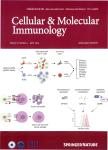Targeting Janus tyrosine kinase 3 (JAK3) with an inhibitor induces secretion of TGF-β by CD4+ T cells
Targeting Janus tyrosine kinase 3 (JAK3) with an inhibitor induces secretion of TGF-β by CD4+ T cells作者机构:Department of Biological Sciences St. Cloud State University St. Cloud MN USA Laboratory for Immunology St. Cloud State University St. Cloud MN USA
出 版 物:《Cellular & Molecular Immunology》 (中国免疫学杂志(英文版))
年 卷 期:2012年第9卷第4期
页 面:350-360页
核心收录:
学科分类:0710[理学-生物学] 071010[理学-生物化学与分子生物学] 081704[工学-应用化学] 07[理学] 08[工学] 0817[工学-化学工程与技术] 071009[理学-细胞生物学] 09[农学] 0901[农学-作物学] 090102[农学-作物遗传育种]
基 金:SCSU OSP Student Research Grants to MO and KG SCSU OSP Faculty Grants to MCC SCSU Hellervik Prize 国家自然科学基金
主 题:FoxP3 Janus tyrosine kinase 3 (JAK3) inhibition regulatory T cells (Tregs) TGF-β type 1 diabetes (TID)
摘 要:Regulatory T cells (Tregs) are critical for the peripheral maintenance of the autoreactive T cells in autoimmune disorders such as type 1 diabetes (TID). Pharmacological inhibition of Janus tyrosine kinase 3 (JAK3) has been proposed as a basis for new treatment modalities against autoimmunity and allogeneic responses. Targeting JAK3 with an inhibitor has previously been shown to exhibit protective action against the development of T 1D in non-obese diabetic (NOD) mice. As the mechanism of such preventative action has been unknown, we hypothesized that JAK3 inhibition induces generation of Tregs. Here, we show that the JAK3 inhibitor 4-(4'-hydroxyphenyl)-amino-6,7-dimethoxyquinazoline (WHI-P131) suppresses proliferation of short-term cultured NOD CD4+ T cells through induction of apoptosis, while promoting survival of a particular population of long-term cultured cells. It was found that the surviving cells were not of the CD4+CD25+FoxP3+ phenotype. They secreted decreased amounts of IL-IO, IL-4 and interferon (IFN)-y compared to the cells not exposed to the optimal concentrations of JAK3 inhibitor. However, an elevated transforming growth factor (TGF)-β secretion was detected in their supernatants. In vivo treatment of prediabetic NOD mice with WHI-P131 did not affect the frequency and number of splenic and pancreatic lymph node CD4+FoxP3+ Tregs, while generating an elevated numbers of CD4+FoxP3- TGF-β-secreting T cells. In conclusion, our data suggest an induction of TGF-β-secreting CD4+ T cells as the underlying mechanism for antidiabetogenic effects obtained by the treatment with a JAK3 inhibitor. To our knowledge, this is the first report of the JAK3 inhibitor activity in the context of the murine Tregs.



